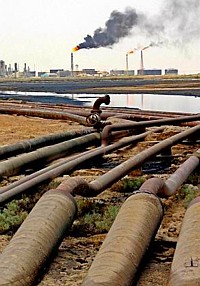Analysis: Basra center of Iraq's oil smuggling, and a microcosm of the war
 WASHINGTON, Dec. 15 (UPI) -- When a joint British and Danish force launched a security raid last week in Basra, Iraq's second-largest city and home of the second-largest oil refinery, it also arrested alleged leaders linked to a petroleum smuggling ring,
WASHINGTON, Dec. 15 (UPI) -- When a joint British and Danish force launched a security raid last week in Basra, Iraq's second-largest city and home of the second-largest oil refinery, it also arrested alleged leaders linked to a petroleum smuggling ring,Both smuggling and security are a growing problem in Iraq, not always mutually exclusive, but fueling the post-Saddam Iraq.
"It all ties together," said Juan Cole, professor of Middle East and South Asian history at University of Michigan and an Iraq expert, who warns that if Basra spirals downward, the whole country will follow.
An estimated 100,000 barrels of oil is smuggled from Iraq each day, according to Saad Rahim, manager of PFC Energy's Country Strategies Group, and an unknown amount of petroleum products, like gasoline, is lifted as well.
Controlled by Shiites experiencing an increase in power struggles, Basra is Iraq's main legal oil export and smuggling port.
The Basra Provincial Council is mostly comprised of members of three Shiite parties that also compete on the national level: al-Fadila, Supreme Council for the Islamic Revolution in Iraq, and the Sadr Movement.
And they face off with Marsh Arabs, a long disenfranchised and sidelined people, not to be overlooked in either the smuggling or the fighting.
Living on stilts in the marshes outside Basra, Marsh Arabs had key access to the Persian Gulf and Iran. "A lot of their activity was smuggling," Cole said.
But then a drought sucked much of their water at the turn of the century, and Saddam Hussein finished it off, expelling them into area shanty towns and into Basra. This created tensions with the local Shiite factions, which are still playing out.
The estimated 500,000 Marsh Arabs, previously a mostly isolated community, live by their own rules still, Cole said, "acting like a mafia family in Basra ... competing with party militias who are also engaged in the same type of smuggling."
Some Marsh Arab factions have aligned with the Mahdi Army, the militia of Moqtada al-Sadr, leader of the Sadr Movement.
Read the rest at UPI

<< Home